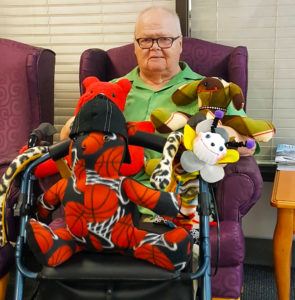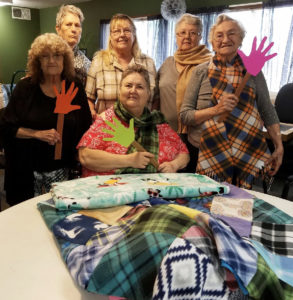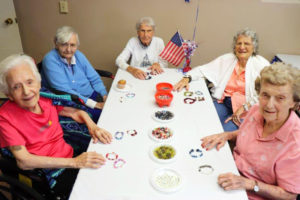Retirement Housing’s Project H.A.N.D.S. Continues to Reach Out for Others

Robert Semple with some of his stuffed creations.
If you glance into the room at Pilgrim Tower North in Pasadena, Calif., you will see Robert Semple quietly bending over his work. In his loving hands, the shape, and then gentle face, of a teddy bear takes shape.
Semple is one of almost 1,400 residents in Retirement Housing Foundation communities across the country who participate in Project H.A.N.D.S.© (Helping Angels National Donated Support), an award-winning program based on the premise that everyone can help others in need. Through the program, residents of RHF communities practice love of neighbor in unique ways.
“I feel that my blessings to make toys is a gift from my God,” says Semple, who studied fashion design in the 1980s, and has help cutting and preparing the fabric for his bears from other Project H.A.N.D.S. members. “Thank you, Jesus!”
Project H.A.N.D.S. was founded in 2004 by Judy A. Shaw, RHF’s director of service coordination, who was looking for a way for residents to be able to give back to their local communities. The program has grown dramatically. Last year alone, participants made more than 20,000 items that were distributed to homeless shelters, shelters for abused persons, children’s hospitals, and other nonprofit organizations.
As the program’s administrator, Shaw coordinates Project H.A.N.D.S., allocating donated funds and tracking participation. When residents of an RHF community decide to participate, they let Shaw know what they will be doing, and Shaw sends a check to cover the cost of their supplies.

The Project H.A.N.D.S. group at Camelot Village makes placements, as well as fleece blankets, hats, and scarves.
Two of the newest Project H.A.N.D.S. groups are at Camelot Village in Council Bluffs, Iowa, and Park Place in Seattle. Shaw says that when new communities join the effort, the word “proud” doesn’t quite describe her thoughts.
“It is more than my pride. It is the knowledge that these residents are going to benefit from participating in this program,” she says. “These residents are going to feel pride. I truly believe that when you help others, the person who gains the most in not the recipient, but the giver.”
Camelot Village is putting together picture books and laminated placemats for patients at a local children’s hospital. They collect such items as old calendars, greeting cards, and magazines to get the pictures for their projects. The group also makes fleece hats, scarves and lap blankets for chemotherapy patients at nearby Heartland Oncology.
At Park Place, participants are working with Othello Village, a tiny house community that provides transitional housing to approximately 48 adults and children in the local community. They assemble special gift boxes filled with personal hygiene supplies that are desperately needed by the residents. The group also is looking to expand its efforts to other local charitable groups.
“I am constantly amazed at the skill and talent and imagination that our residents bring to the table,” says Shaw. “I am constantly saying, ‘How did they think of that?’”
Everyone in on the Act

The Sun City Gardens group displays the inspirational bracelets they create for children being placed into foster care.
At Retirement Housing Foundation, Project H.A.N.D.S. is labor of love for both employees and residents. The program has no large corporate sponsors to provide support, and the often unsung heroes of the program are the employees.
“This program is dependent upon the generosity of the RHF staff throughout the nation who, through their payroll deductions, fund this program,” says Shaw.
Residents often pitch in, too. One resident at Harvest Pointe in Loveland, Colo., donated fabric pieces to the Project H.A.N.D.S. group. The fabric was used to create colorful pads for the animal pens at the local Humane Society. The pads keep the pets comfortable as they await their forever homes.
The Project H.A.N.D.S. group at Sun City Gardens in Menifee, Calif., creates bracelets for a local nonprofit group that assists in placing foster children into loving homes. Each bracelet has an inspirational saying. Often the children arrive with only the clothes on their backs, so the bracelet gifts are infused with special meaning for them.
“I know that Project H.A.N.D.S. has a positive impact on those who make the items,” say the Rev. Laverne Joseph, RHF president. “And it also makes a difference for those who receive the items.”
Joseph tells a story of a mother and her children in a center for abused persons. The mother and children had been at the center for weeks in order to avoid an abuse situation, but the mother couldn’t find the courage to leave her husband. Then the children received gloves, hats, and scarves from a local Project H.A.N.D.S. group.
The items “caused her to remember her grandmother, who used to knit,” says Joseph. “Grandmother had been in an abusive situation and she had the courage to leave. That memory gave this mother the courage to make a change.”
“Other stories may not be that dramatic,” Joseph adds, “but Helping Angels National Donated Support (HANDS) does make a difference on those whose hands make the items, and the hands that receive them.”
Shaw sees the program continuing to grow “because there will always be a need in our nation for persons who are generous with their time and talent and who, at the same time, are satisfying their need to be needed.”
Project H.A.N.D.S., she adds, “will continue to grow and be a little resource within each community where our residents live.”
Donations to Project H.A.N.D.S. are always welcome. Visit http://www.rhf.org/donate-to-rhf/ to make a gift.
Join Our Mailing LIst
"*" indicates required fields
